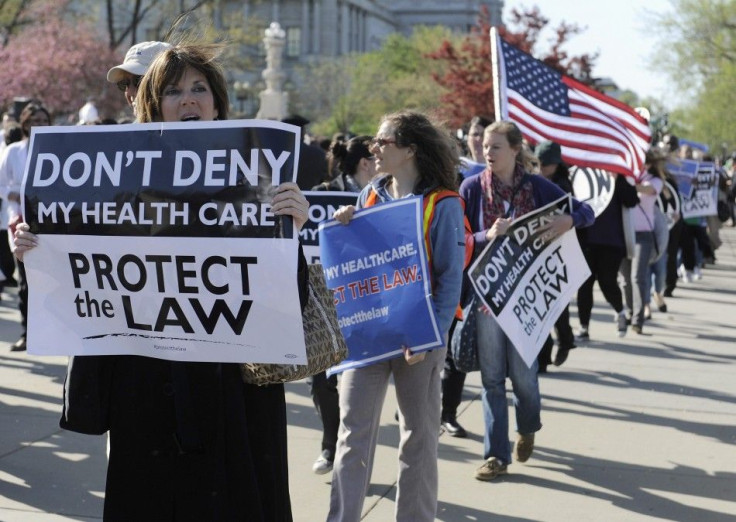Conservative Justices Skeptical Of Insurance Mandate On Day 2

WASHINGTON -- The U.S. Supreme Court's conservative justices expressed concern Tuesday that forcing Americans to buy medical insurance could open the door to other intrusions by the federal government, casting doubt about the fate of President Barack Obama's 2010 health care overhaul.
Skepticism seemed to inform numerous pointed comments from three of the court's four staunch conservatives as the justices spent a second day hearing a challenge to the Patient Protection and Affordable Care Act.
The same could be said of questions directed by Justice Anthony Kennedy, often the court's 5-4 swing vote in decisive cases, who said the government has a very heavy burden of justification for the law's requirement that Americans carry health insurance or pay a penalty.
That requirement, known as the individual mandate, was the focus of Tuesday's two-hour session in the high court. It is the linchpin of the law and the question it poses -- whether Congress's power to regulate markets justifies the forced purchase of a good or service -- has sharply divided Americans in a tense presidential election year.
Solicitor General Donald Verrilli, the Obama administration's Supreme Court lawyer, presented his side of the case first on Tuesday. He was immediately beset by a series of speculative questions from the conservative justices after the court's four liberals offered relatively friendly inquiries. However, two of them, Ruth Bader Ginsburg and Stephen Breyer, frequently countered their conservative colleagues' skeptical questions.
The Obama administration argues that Congress can use its authority under the Commerce Clause of the Constitution to impose the insurance-purchase mandate. The clause gives Congress power to regulate interstate commerce by, among other things, levying taxes that benefit the populace.
The Supreme Court has upheld federal statutes regulating all manner of businesses -- cases that have been supported by some of the currently serving conservative justices.
But on Tuesday the four repeatedly insisted that the mandate forces people to enter a market, which Kennedy in particular said was a troubling expansion of federal power. Kennedy, a nominee of President Ronald Reagan, also prodded Verrilli to explain why the same reasoning couldn't apply to food.
After Verrilli argued that the individual mandate doesn't require Americans to buy health care but rather regulates when and how they'll pay for care, Justices Kennedy, Antonin Scalia and Samuel Alito, along with Chief Justice John Roberts, sought further explanation.
They asked if Congress can force individuals to buy items or services aside from health care. Roberts, for instance, pondered whether the government could require purchases of cell phones, since that would aid the response of fire and ambulance services in an emergency.
Verrilli argued that the Affordable Care Act's mandate wouldn't provide an opening for other requirements because health care services are unique. If one person elects not to get insurance but then gets sick, that person will ultimately pass that cost along to everyone else, the lawyer said.
One big difference, Verrilli said in comparing other goods and service to health care, is you don't have costs shifting to other participants.
When Scalia cited a rhetorical question about the difference between having to buy broccoli and having to get health insurance, the solicitor general retorted: Health insurance is the means of payment for health care; broccoli is not the payment for anything.
Scalia, another Reagan nominee, pointed out repeatedly on Tuesday that the Constitution limits federal power with the rest left to state governments and citizens. The argument there is that the people were left to decide whether to buy health insurance, he said.
Ginsburg, appointed to the court by Bill Clinton, later countered by saying, The people who don't participate in this market are making it more expensive for those who do.
You could say that about buying a car, Scalia retorted, adding that if enough people don't buy cars the cost of ownership could rise.
Breyer, another Clinton appointee, said during Tuesday's session that enforcing the insurance-buying mandate is akin to a justifiable requirement that Americans pay for a vaccine immunizing them against a nationwide virus. It's hard for me to understand why that's not interstate commerce, he said.
Paul Clement, representing the 26 states that brought the lawsuit challenging the health care law, didn't face pressing questions to the degree Verrilli did Tuesday.
But Clement, who served as solicitor general during George W. Bush's presidency, made clear how he believes the justices should rule, saying that allowing the individual mandate to stand could induce the government to impose similar demands throughout the nation's economy. It works in every single industry, he told the court.
(Dan Rivoli reported from Washington; Ashley Portero reported from New York)--
© Copyright IBTimes 2024. All rights reserved.











